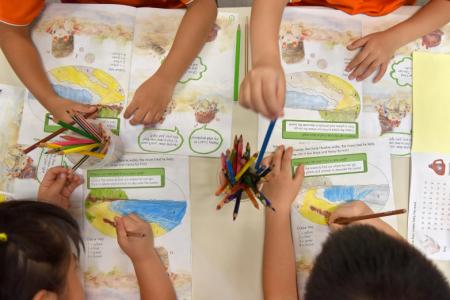Singapore is top in Pisa, but where are all our innovators?
Despite topping global benchmark Pisa, S'pore needs to work on teaching students to innovate and take risks
We may have topped every domain in the Programme for International Student Assessment (Pisa) 2015.
Yet, when it comes to producing top scientists, entrepreneurs and the like, Singapore is not the first country that comes to mind, said former Singapore Children's Society researcher Ong Xiang Ling, who spoke at a forum last month.
"Our students may be afraid to make mistakes because in high-stakes exams, they cannot afford to make mistakes.
"Parents may go to great lengths to protect children from failure. But such an environment may not be conducive for children to learn how to be resilient," she argued, urging parents to rethink the formula for success.
Our students' risk-aversion nature is something the Ministry of Education (MOE) has been trying to fix.
In March, Education Minister (Schools) Ng Chee Meng told Parliament: "Some employers I have spoken to tell me they want to see more entrepreneurial dare in our students. They say our students are smart, but some are afraid to embrace risks in trying new things, or new ways of doing things.
"Because it is easy to become hemmed in by our own successes, we must help our children venture out of their comfort zones and fail-safe modes."
The ability to bounce back from failure is one half of developing that "entrepreneurial dare".
The other half, said Mr Ng, lies in having the spirit of enterprise: to quickly analyse complex issues and identify problems, develop new ideas, seize opportunities and take action.
To nurture these traits, MOE reshaped the education framework to combine classroom learning with outdoor activities, and allow learning to take on real-world context.
Parents may go to great lengths to protect children from failure. But such an environment may not be conducive for children to learn how to be resilient.Former Singapore Children’s Society researcher Ong Xiang Ling
Students at Teck Whye Secondary School, for instance, learnt the science of plant genetics through breeding the golden orchid - a five-year effort from five different graduating cohorts.
At the pre-school level, five-year-olds at MOE Kindergarten @ Springdale learnt about responsibility through caring for class pets Chilli and Pepper,which are crabs
Such play-based learning and focus on social skills in early-years education, rather than on academics, are consistent in countries that do well in Pisa, wrote international education consultant Lucy Crehan in her book Cleverlands, a book on top Pisa countries.
This, despite criticism that Pisa leaves out the less measurable aspects of education, such as civic and artistic development.
As a report last month by education think-tank The Head Foundation pointed out, the strength of benchmarks like Pisa lies in its potential to identify how well - or badly - education policies have worked.
With such benchmarks, one common component across different countries is the education system, which is a common influence for all students, said Professor Kerry Kennedy from the Education University of Hong Kong.
POSITIVE
In Singapore, it seems clear from the results that the system must be playing a positive role, the curriculum studies expert told The New Paper.
"Schools, of course, are also influenced by the system - curriculum, teacher quality, resource distribution - so again, the system would seem to be doing well," he said.
Tertiary education then becomes key to help our children become trailblazers in the mould of water-solutions company Hyflux founder Olivia Lum and gaming hardware firm Razer's co-founder Tan Min-Liang.
Said Prof Kennedy: "Schools provide foundational skills that allow students to take up further study or enter the workforce. These skills provide the foundation for further skills building."
Institutes of higher learning must then take the responsibility for building on the success of Singapore students.
He said: "(Students) have the foundation skills, but they need to be placed in tertiary education contexts or workplace training that will extend these into various domains, such as technology innovation, entrepreneurship, and the creative industries. That is, the whole education system and its different parts must work together.
"Schools are doing their part. But are the universities and other advanced training institutes? This is the real question."
Get The New Paper on your phone with the free TNP app. Download from the Apple App Store or Google Play Store now



